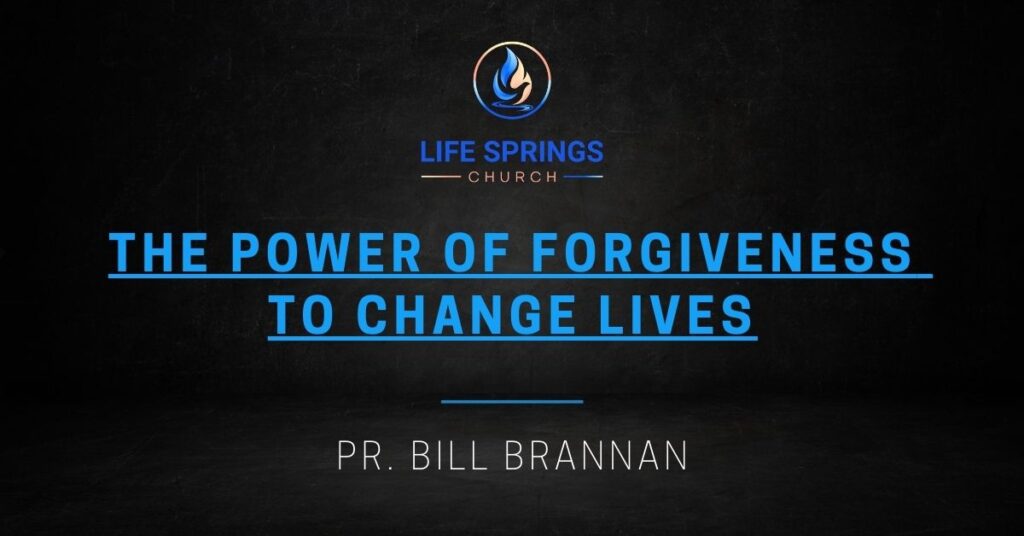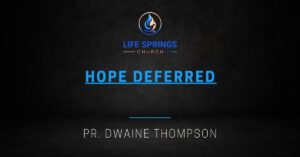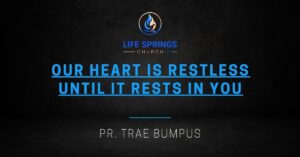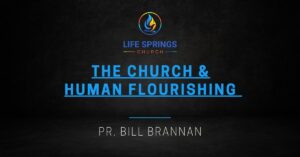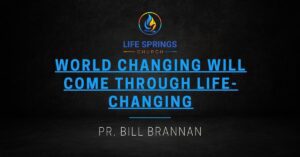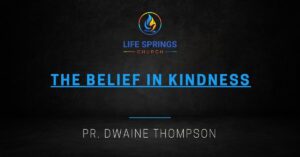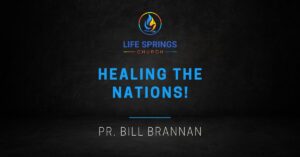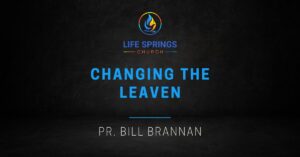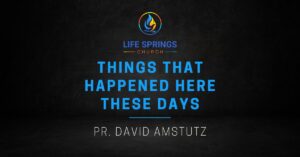The Transformative Power of Forgiveness

In ‘The Power of Forgiveness That Changes Everything,’ Pastor Bill Brannan delves into the profound impact that forgiveness can have on individuals and society as a whole. This sermon explores scriptural teachings, historical contexts, and personal stories that highlight how embracing forgiveness can lead to healing and transformation.
The Power of Forgiveness to Change Lives
Forgiveness is a powerful catalyst for change. It can transform hearts and heal relationships. When we forgive, we often release ourselves from the burden of anger and resentment, allowing us to embrace a more peaceful existence.

Photo by imam hassan on Unsplash
Forgiveness doesn’t just benefit the one being forgiven; it profoundly impacts the forgiver. By letting go of grudges, individuals can experience emotional and spiritual healing. This act of compassion fosters a sense of freedom and liberation, allowing people to move forward in life without being anchored to past hurts.

Photo by Nathan Anderson on Unsplash
Forgiveness as a Pathway to Healing
Forgiveness can lead to significant personal transformation. Many find that through the process of forgiving others, they begin to heal their own wounds. This journey often involves self-reflection and the realization that everyone, including ourselves, makes mistakes.

Photo by Juan Davila on Unsplash
The Role of Forgiveness in Relationships
Forgiveness plays a critical role in maintaining healthy relationships. It allows individuals to rebuild trust and foster deeper connections. Without forgiveness, relationships can deteriorate, leading to isolation and bitterness.
Matthew 6:14-15 – Forgiveness Teachings
In Matthew 6:14-15, Jesus emphasizes the importance of forgiveness in our spiritual lives. He states that forgiveness is not merely a suggestion but a requirement for receiving forgiveness from God. This teaching highlights the reciprocal nature of forgiveness.

Photo by Aaron Burden on Unsplash
This passage challenges believers to reflect on their attitudes toward forgiveness. It urges us to consider how our willingness to forgive others affects our relationship with God. The implications are profound; true forgiveness can lead to spiritual renewal and growth.

Photo by Michael Glazier on Unsplash
Understanding the Depth of Forgiveness
Forgiveness requires humility and a willingness to let go of past grievances. It is not always easy and often involves a conscious decision to release anger and resentment. This act can be a profound step toward healing, not just for those we forgive but also for ourselves.

Photo by Joshua Hanks on Unsplash
Practical Steps to Forgiveness
- Acknowledge your feelings: Recognize the pain and hurt caused by others.
- Reflect on the situation: Understand the context of the actions that hurt you.
- Make a conscious choice: Decide to forgive, even if it feels difficult.
- Communicate your forgiveness: If possible, express your forgiveness to the person involved.
- Seek support: Engage with friends or counselors who can help you through the process.

Photo by Gabriella Clare Marino on Unsplash
Understanding the Unforgivable Sin
The concept of the unforgivable sin often leads to confusion and fear among believers. This term primarily refers to blasphemy against the Holy Spirit, which Jesus describes in Matthew 12:31-32. It raises the question: what does it mean to commit this sin?

Photo by Mel Lituañas on Unsplash
At its core, blasphemy against the Holy Spirit is a rejection of the Spirit’s work in one’s life. It signifies a hardened heart that refuses to acknowledge God’s grace and forgiveness. This understanding emphasizes the importance of remaining open to the Holy Spirit’s guidance.

Photo by Aziz Acharki on Unsplash
Implications of the Unforgivable Sin
Committing the unforgivable sin does not imply that God is unwilling to forgive. Rather, it suggests that an individual has chosen to turn away from the very source of forgiveness. This choice can lead to spiritual desolation, where one becomes unable to respond to God’s call.

Photo by Darius Bashar on Unsplash
What is Antichrist – Definition and Characteristics
The term “Antichrist” conjures various interpretations in both religious and popular culture. At its essence, the Antichrist represents anything that opposes Christ and His teachings. This can manifest through ideologies, actions, or even individuals who seek to undermine the foundational truths of Christianity.

Photo by Markus Spiske on Unsplash
Characteristics of the Antichrist
- Opposition to Christ: Directly contradicts the teachings and nature of Jesus.
- Deceptive Nature: Often presents itself as a false representation of truth.
- Disregard for God’s Authority: Seeks to undermine the sovereignty of God.
- Promotion of False Teachings: Encourages beliefs that lead individuals away from the truth of the Gospel.

Photo by Tim Wildsmith on Unsplash
Antichrist in the Flesh – Manifestation and Implications
The manifestation of the Antichrist can be seen in various forms throughout history. It often appears in political movements, social ideologies, or even individuals who claim to be saviors but lead people away from Christ. Understanding this concept is crucial for discerning truth in a world filled with deception.

Photo by Markus Spiske on Unsplash
Historical Context of the Antichrist
Historically, many figures have been labeled as the Antichrist due to their actions and ideologies. These individuals often promote systems that oppress or marginalize others while claiming to bring about salvation or enlightenment. Recognizing these patterns can help believers navigate contemporary challenges.

Photo by Eric Prouzet on Unsplash
The Historical Impact of the Gospel – Transformation Through Faith
The Gospel’s influence throughout history has been transformative. It has inspired movements for justice, equality, and compassion. Many social changes can be traced back to the core teachings of Christ, which emphasize love, forgiveness, and the inherent value of every human being.

Photo by Austrian National Library on Unsplash
Case Studies of Transformation
- Social Justice Movements: Many leaders, inspired by the teachings of Christ, have fought for civil rights and justice.
- Charitable Organizations: Numerous charities and humanitarian efforts stem from Christian principles of love and compassion.
- Education and Healthcare: The establishment of schools and hospitals often has roots in Christian missions.

Photo by Luca Bravo on Unsplash
The Legacy of MLK – Influence on Civil Rights
Dr. Martin Luther King Jr. stands as a prominent figure in the fight for civil rights, embodying the principles of forgiveness and nonviolence. His teachings were deeply rooted in his Christian faith, which guided his approach to social justice.

Photo by History in HD on Unsplash
King’s legacy continues to inspire movements for equality and justice. He demonstrated how the power of love and forgiveness could challenge systemic oppression and bring about meaningful change. His life serves as a testament to the transformative power of the Gospel in action.

Photo by Library of Congress on Unsplash
Key Principles from MLK’s Teachings
- Nonviolent Resistance: Advocated for peaceful protests and dialogues.
- Love as a Weapon: Emphasized love over hate in the fight for justice.
- Unity and Community: Encouraged collective action for social change.

Photo by Samantha Sophia on Unsplash
Recognizing the Authentic Kingdom or Fighting Against It – Spiritual Discernment
Spiritual discernment is crucial in today’s world, where many ideologies compete for attention. Recognizing the authentic Kingdom requires an understanding of the values that align with Christ’s teachings. It’s not merely about adhering to rules but embodying the spirit of love, grace, and forgiveness.

Photo by Ashley Batz on Unsplash
In our quest for truth, we must be vigilant against the temptation to judge others harshly. This judgment can stem from a rigid interpretation of doctrine rather than a compassionate understanding of the human experience. True discernment involves seeing beyond the surface and recognizing the inherent worth of every individual.

Photo by Sebastian Bill on Unsplash
Challenges in Discernment
- Zeal Without Love: A fervent commitment to doctrine can lead to a lack of compassion, which undermines the essence of the Gospel.
- Fear of Deviation: The fear of straying from tradition can cause individuals to dismiss new insights that align with Christ’s message of love.
- Mislabeling Others: Labeling those who disagree as heretics can create division rather than fostering unity in Christ.

Photo by Gyan Shahane on Unsplash
The Destruction of the Second Temple – Historical Context and Significance
The destruction of the Second Temple in 70 AD marked a pivotal moment in Jewish history. It represented not only the loss of a physical structure but also a profound spiritual crisis. This event serves as a reminder of the consequences of failing to embody the true spirit of faith.

Photo by Sonika Agarwal on Unsplash
Historically, the Second Temple was a center of worship and community. Its destruction symbolized the failure of the people to maintain their covenant with God. The Jewish sages reflected on this catastrophe, recognizing that their internal conflicts and baseless hatred contributed significantly to their downfall.
Lessons from History
- Unity is Vital: The importance of community and mutual respect cannot be overstated in maintaining spiritual integrity.
- Self-Reflection: Historical events urge us to examine our actions and attitudes toward others.
- Consequences of Division: A divided community can lead to disastrous outcomes, both spiritually and physically.

Photo by Vonecia Carswell on Unsplash
Unforgiveness as a Form of Denying Jesus in the Flesh – Spiritual Consequences
Unforgiveness creates a barrier between us and the essence of Christ’s teachings. Holding onto grudges prevents us from experiencing the full measure of grace that God offers. It can be seen as a denial of the transformative power of Jesus, which calls us to forgive as we have been forgiven.

Photo by Dillon Winspear on Unsplash
When we refuse to forgive, we not only harm ourselves but also resist the work of the Holy Spirit in our lives. This resistance can lead to spiritual stagnation, where bitterness and resentment take root, overshadowing the joy and peace that come from living in alignment with God’s will.

Photo by Priscilla Du Preez 🇨🇦 on Unsplash
Consequences of Unforgiveness
- Spiritual Isolation: Unforgiveness can isolate us from God and others, creating a sense of loneliness.
- Emotional Distress: Holding onto anger can lead to mental and emotional turmoil, affecting overall well-being.
- Blockage of Grace: Unforgiveness can hinder our ability to receive God’s grace, perpetuating a cycle of sin and regret.

Photo by Pawel Czerwinski on Unsplash
The Greatest Blessing You Could Give Me – Meaning of Blessings
True blessings extend beyond material wealth and prosperity. They encompass acts of kindness, love, and forgiveness. When we bless others, we participate in the divine flow of grace that enriches both the giver and the receiver.

Photo by Andrea Tummons on Unsplash
Understanding the meaning of blessings involves recognizing how our actions can impact others profoundly. A simple act of forgiveness can be one of the greatest blessings we offer, breaking chains of bitterness and resentment that bind us and those around us.

Photo by kabita Darlami on Unsplash
The Nature of True Blessings
- Selflessness: Genuine blessings come from a place of love and selflessness, reflecting the heart of Christ.
- Transformation: Blessings have the power to transform lives, fostering healing and reconciliation.
- Legacy of Love: The blessings we create can leave a lasting impact, shaping future generations.

Photo by Simon Hurry on Unsplash
Forgiveness – Importance and Impact
Forgiveness is essential for spiritual growth and emotional well-being. It allows individuals to release the burdens of anger and resentment, creating space for healing. The act of forgiving has a ripple effect, impacting not only the individual but also the community.

Photo by Steve DiMatteo on Unsplash
Understanding the importance of forgiveness involves recognizing its role in restoring relationships and fostering unity. It is a deliberate choice that reflects the heart of God, who forgives us despite our flaws and failures.

Photo by Gama. Films on Unsplash
Impact of Forgiveness
- Healing Relationships: Forgiveness can mend broken relationships, bringing people together in love.
- Emotional Freedom: Letting go of grudges liberates us from the emotional weight of unforgiveness.
- Spiritual Growth: Forgiveness fosters a deeper relationship with God, encouraging spiritual maturity.

Photo by Maayan Nemanov on Unsplash
The Power to Forgive – Healing and Freedom
The power to forgive lies within each of us, influenced by our relationship with God. When we embrace forgiveness, we unlock healing and freedom for ourselves and others. This power is transformative, capable of changing lives and communities.

Photo by Karsten Würth on Unsplash
Healing comes when we choose to forgive, allowing God’s grace to flow through us. It breaks the cycle of pain and resentment, paving the way for restoration and peace. The freedom gained through forgiveness is a precious gift that empowers us to live fully in the present.

Photo by Katherine Hanlon on Unsplash
The Process of Forgiveness
- Recognizing Hurt: Acknowledging the pain caused by others is the first step toward forgiveness.
- Choosing to Forgive: Make a conscious decision to forgive, despite the difficulty.
- Embracing Healing: Allow the healing process to unfold, trusting in God’s grace.

Photo by Pablo Lancaster Jones on Unsplash
The Power of Forgiveness to Change Lives
(Preaching Outline)
1) A challenging passage on forgiveness – after Jesus taught his disciples to pray:
a) Matthew 6:14–15 (NKJV) — 14 “For if you forgive men their trespasses, your heavenly Father will also forgive you. 15 But if you do not forgive men their trespasses, neither will your Father forgive your trespasses.
i) At face value, how does this passage depict salvation? How does it depict God?
ii) A major part of discipleship is teaching critical thinking, wisdom and discernment. Jesus expects us to wrestle with what He says in the context of all God has spoken in scripture and the witness of the Holy Spirit in our lives.
2) Here is another challenging scripture – I am not going to expound it thoroughly, but just some thoughts that will hopefully inspire meditation:
a) Matthew 12:31–33 (NKJV) — 31 “Therefore I say to you, every sin and blasphemy will be forgiven men, but the blasphemy against the Spirit will not be forgiven men. 32 Anyone who speaks a word against the Son of Man, it will be forgiven him; but whoever speaks against the Holy Spirit, it will not be forgiven him, either in this age or in the age to come. 33 “Either make the tree good and its fruit good, or else make the tree bad and its fruit bad; for a tree is known by its fruit.
i) Is not forgiving others blasphemy against the Holy Spirit?
ii) The logic seems to be 1. Scripture says if we do not forgive, we will not be forgiven & 2. The only sin which will not be forgiven is blasphemy against the Spirit of God.
b) It seems to be connected to recognizing and embracing the Spirit of Christ and His Kingdom.
c) Is vs. 32 redundant, or is it hinting at something?
i) If we are of a right spirit, could we speak against Jesus? That verse implies that speaking against Jesus is not necessarily speaking against the Holy Spirit. I think these are challenging ideas.
ii) Is it possible that genuine doubts and misunderstandings may not be motivated by an anti-Christ spirit?
d) Vs. 33 seems to suggest that Jesus wants to actually reproduce His life in us and manifest His kingdom in the flesh. I encourage you to do a search in the gospels for every reference to fruit and see what you think about that idea.
3) A video sent to Mel and me from another pastor in LH.
a) It was a podcast with 3 speakers defending a clip online where John McArthur stated that Martin Luther King Jr. was not a Christian. They show that King said at one point that he did not believe Jesus was God in the flesh. They then applied this passage:
b) 1 John 4:1–3 (NKJV) — 1 Beloved, do not believe every spirit, but test the spirits, whether they are of God; because many false prophets have gone out into the world. 2 By this you know the Spirit of God: Every spirit that confesses that Jesus Christ has come in the flesh is of God, 3 and every spirit that does not confess that Jesus Christ has come in the flesh is not of God. And this is the spirit of the Antichrist, which you have heard was coming, and is now already in the world.
c) It sounds like King spoke a word against the son of man.
d) They located King in the line of liberation theology from Rev. Cone to modern wokeism, DEI and critical race theory. They said he was part of a movement rooted in envy, hatred jealousy, covetousness and sinful partiality.
e) It seems to me that if we were to discern the spirit of King, that describes the opposite of his legacy which seemed to move toward forgiveness and true equality.
f) Scott McKay writes, “King’s message to America was much like that of Douglass—he wanted a colorblind country in which it was the content of one’s character that mattered. And it was a lot like Washington’s (Booker T Washington) —“If a man is called to be a street sweeper,” said King, “he should sweep streets even as a Michelangelo painted, or Beethoven composed music or Shakespeare wrote poetry. He should sweep streets so well that all the hosts of heaven and earth will pause to say, ‘Here lived a great street sweeper who did his job well.’” King captured the fascination and hearts of Americans because he was notably imbued with the spirit of the nation’s founders. His message was quintessential America at our best.”[1]
g) Thoughts on what denying Jesus came in the flesh might be.
4) The challenge of orthodoxy and blasphemy against the Spirit.
a) It seems reasonable that Jesus spoke about the blasphemy of the spirit because that was what the Jews were doing. Maybe Jesus was that bold as an attempt to wake them out of it.
b) Rabbi Sacks on the destruction of the second temple:
c) Our explanation [of this phrase] is that they were righteous and pious [tzaddikim veĥasidim] and laboured in the Torah. But they were not upright in their dealings with the world. Thus, as a result of the baseless hatred in their hearts, they suspected anyone who did not act in accordance with their opinions of being a Sadducee and a heretic. As a result they descended to murder and other evils, until eventually the Temple was destroyed.[2]
d) Why was Jerusalem at the time of the First Temple destroyed? Because of the idolatry, forbidden sexual relationships, and bloodshed that were to be found therein. But as for the Second Temple, we recognise that its inhabitants laboured in the Torah and were scrupulous in giving tithes. Why then were they exiled? Because they loved money and hated one another – which teaches us that God hates hatred between people, and Scripture reckons it as equal to idolatry, forbidden sex, and bloodshed combined.[3]
e) The importance of discerning the spirit and character of Christ and His kingdom.
5) It is all about Jesus in the flesh and His kingdom manifested in our lives.
a) Could it be that God will not forgive us if we do not forgive others because he can’t?
b) What I mean is, Could it be that holding on to bitterness, anger, resentment and unforgiveness kills our soul?
c) Could it be that unforgiveness is a form of denying Jesus in the flesh and blaspheming the Holy Spirit?
d) The cross and Christianity – “Father forgive them.”
6) A story of the transforming power of the Holy Spirit and forgiveness.
a) A few weeks ago, Cheryl told us a powerful testimony. The next morning I was pondering the idea of a message to the world, “Kill my seed.”
b) In December of 1981, Stephen Morin, a serial killer and rapist of around 30 women, abducted Margie Palm.
c) A powerful testimony on YouTube: https://www.youtube.com/watch?v=pMjSmLCuaA0
d) “The night before her kidnapping, Palm read about Corrie ten Boom, a Holocaust survivor and activist who found healing in forgiving a Nazi guard stationed at the concentration camp where her sister was killed. Loving someone who loves you is easy, Palm knew. The true challenge was loving someone who hates you. On the morning of December 11, before she encountered the serial killer who would change her life, she knelt in her closet and told God she would serve him however he needed her to that day.”[4]
e) (Summarize the story)
f) Explain “Kill my seed”
[1] McKay, Scott. The Revivalist Manifesto: How Patriots Can Win the Next American Era (p. 119). Bombardier Books. Kindle Edition.
[2] Sacks, Jonathan. Deuteronomy: Renewal of the Sinai Covenant (Covenant & Conversation Book 5) (pp. 272-273). The Toby Press. Kindle Edition.
[3] Sacks, Jonathan. Deuteronomy: Renewal of the Sinai Covenant (Covenant & Conversation Book 5) (p. 273). The Toby Press. Kindle Edition.
[4] Miller, Julie. “True Crime, True Faith: The Serial Killer and the Texas Mom Who Stopped Him.” Vanity Fair, 9 Aug. 2023, www.vanityfair.com/style/2023/08/the-serial-killer-and-the-texas-mom-who-stopped-him.
After this message I decided to read a bunch of King Sermons. Here are some excerpts from one of them.
We look at the struggle, the ideological struggle between communism on the one hand and democracy on the other, and we see the struggle between America and Russia. Now certainly, we can never give our allegiance to the Russian way of life, to the communistic way of life, because communism is based on an ethical relativism and a metaphysical materialism that no Christian can accept. When we look at the methods of communism, a philosophy where somehow the end justifies the means, we cannot accept that because we believe as Christians that the end is pre-existent in the means. But in spite of all of the weaknesses and evils inherent in communism, we must at the same time see the weaknesses and evils within democracy.[1]
A second thing that an individual must do in seeking to love his enemy is to discover the element of good in his enemy, and every time you begin to hate that person and think of hating that person, realize that there is some good there and look at those good points which will over-balance the bad points. I’ve said to you on many occasions that each of us is something of a schizophrenic personality. We’re split up and divided against ourselves. And there is something of a civil war going on within all of our lives. There is a recalcitrant South of our soul revolting against the North of our soul.[2]
The person who hates you most has some good in him; even the nation that hates you most has some good in it; even the race that hates you most has some good in it. And when you come to the point that you look in the face of every man and see deep down within him what religion calls “the image of God,” you begin to love him in spite of. No matter what he does, you see God’s image there. There is an element of goodness that he can never slough off. Discover the element of good in your enemy.[3]
There’s another reason why you should love your enemies, and that is because hate distorts the personality of the hater. We usually think of what hate does for the individual hated or the individuals hated or the groups hated. But it is even more tragic, it is even more ruinous and injurious to the individual who hates. You just begin hating somebody, and you will begin to do irrational things. You can’t see straight when you hate. You can’t walk straight when you hate. You can’t stand upright. Your vision is distorted. There is nothing more tragic than to see an individual whose heart is filled with hate. He comes to the point that he becomes a pathological case. For the person who hates, you can stand up and see a person and that person can be beautiful, and you will call them ugly. For the person who hates, the beautiful becomes ugly and the ugly becomes beautiful. For the person who hates, the good becomes bad and the bad becomes good. For the person who hates, the true becomes false and the false becomes true. That’s what hate does. You can’t see right. The symbol of objectivity is lost. Hate destroys the very structure of the personality of the hater.[4]
Now there is a final reason I think that Jesus says, “Love your enemies.” It is this: that love has within it a redemptive power. And there is a power there that eventually transforms individuals. That’s why Jesus says, “Love your enemies.” Because if you hate your enemies, you have no way to redeem and to transform your enemies. But if you love your enemies, you will discover that at the very root of love is the power of redemption. You just keep loving people and keep loving them, even though they’re mistreating you. [5]
[1] “‘Loving Your Enemies,’ Sermon Delivered at Dexter Avenue Baptist Church.” The Martin Luther King, Jr. Research and Education Institute, kinginstitute.stanford.edu/king-papers/documents/loving-your-enemies-sermon-delivered-dexter-avenue-baptist-church.
[2] “‘Loving Your Enemies,’ Sermon Delivered at Dexter Avenue Baptist Church.” The Martin Luther King, Jr. Research and Education Institute, kinginstitute.stanford.edu/king-papers/documents/loving-your-enemies-sermon-delivered-dexter-avenue-baptist-church.
[3] “‘Loving Your Enemies,’ Sermon Delivered at Dexter Avenue Baptist Church.” The Martin Luther King, Jr. Research and Education Institute, kinginstitute.stanford.edu/king-papers/documents/loving-your-enemies-sermon-delivered-dexter-avenue-baptist-church.
[4] “‘Loving Your Enemies,’ Sermon Delivered at Dexter Avenue Baptist Church.” The Martin Luther King, Jr. Research and Education Institute, kinginstitute.stanford.edu/king-papers/documents/loving-your-enemies-sermon-delivered-dexter-avenue-baptist-church.
[5] “‘Loving Your Enemies,’ Sermon Delivered at Dexter Avenue Baptist Church.” The Martin Luther King, Jr. Research and Education Institute, kinginstitute.stanford.edu/king-papers/documents/loving-your-enemies-sermon-delivered-dexter-avenue-baptist-church.

